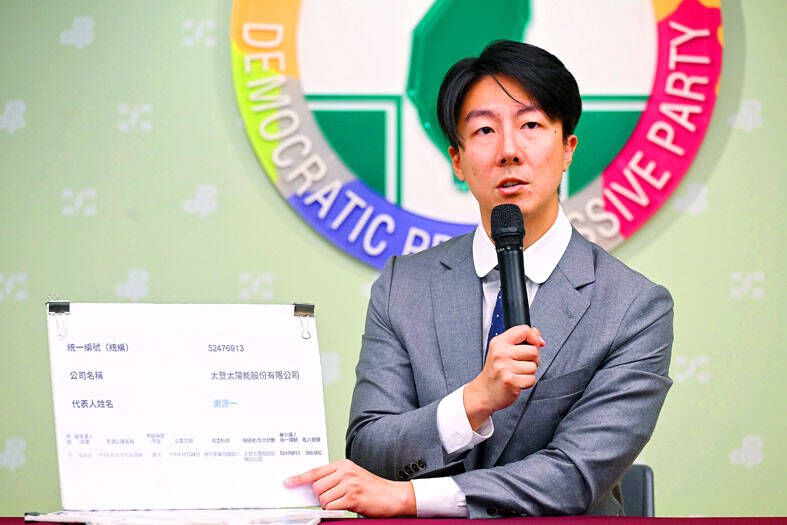HD Renewable Energy Co (HDRE) and other firms implicated in corruption probes into the green energy sector have links to Chinese Nationalist Party (KMT) politicians and financial backers, Democratic Progressive Party (DPP) officials said at a news conference yesterday.
KMT officials and their supporters should scrutinize their own involvement in these green energy scandals, instead of attacking the government and the ruling party following the opening of an investigation by Taipei prosecutors earlier this week, DPP spokesman Justin Wu (吳崢) said.
The probe led to the detention of Cheng Yi-lin (鄭亦麟), who was deputy executive director of the Ministry of Economic Affairs’ Green Energy Industry Promotion Center, as well as the questioning of executives of Taipei-based Tungwei Construction and HDRE, which specializes in solar power technology.

Photo: Chang Chia-ming, Taipei Times
Cheng is accused of using his position to “pressure” green energy firms and state-owned Taiwan Power Co (Taipower) to take bribes in contravention of the Anti-Corruption Act (貪污治罪條例), having personal assets of unproven origin, and contravening the Money Laundering Control Act (洗錢防制法), prosecutors said.
Wu said that recent attacks by opposition parties and their supporters produced disinformation, alleging Cheng was a party patronage appointment, adding that KMT official Ling Tao (凌濤) accused HDRE of having close links to the DPP.
HDRE chairman Hsieh Yuan-yi (謝源一) “is the son-in-law of KMT old guard Chang Ya-chung (張亞中)” and is a big donor to the KMT, Wu said, adding that companies under Hsieh’s management had made considerable financial contributions to back the election campaigns of New Taipei City Mayor Hou You-yi (侯友宜) of the KMT.
KMT members must stop practising double standards, as they blame corruption probes in the green energy sector on DPP politicians and local governments, when it is KMT members who are embroiled in the majority of these cases, Wu said.
“We support judicial investigations that apply the same standards, regardless of party affiliation, to root out bribery and corruption, and all forms of unlawful activities,” he said.
Developing sustainable green energy is of vital importance for Taiwan’s industries and the workforce, he said.
It must not become a means for personal profiteering through bribes and payoffs by a few firms and people, he said.
The DPP has always supported this stance, Wu said, adding that the party is in full support of investigations and prosecution of anyone who uses green energy for corrupt ends.
Wu cited numerous corruption cases involving KMT politicians in the field of green energy, such as former KMT legislators Sra Kacaw and Sufin Siluko, former Yunlin County Council speaker Shen Chung-lung (沈宗隆), KMT Vice Chairman Andrew Hsia (夏立言), former deputy premier Woody Duh (杜紫軍), and several other party politicians.

A small number of Taiwanese this year lost their citizenship rights after traveling in China and obtaining a one-time Chinese passport to cross the border into Russia, a source said today. The people signed up through Chinese travel agencies for tours of neighboring Russia with companies claiming they could obtain Russian visas and fast-track border clearance, the source said on condition of anonymity. The travelers were actually issued one-time-use Chinese passports, they said. Taiwanese are prohibited from holding a Chinese passport or household registration. If found to have a Chinese ID, they may lose their resident status under Article 9-1

Taiwanese were praised for their composure after a video filmed by Taiwanese tourists capturing the moment a magnitude 7.5 earthquake struck Japan’s Aomori Prefecture went viral on social media. The video shows a hotel room shaking violently amid Monday’s quake, with objects falling to the ground. Two Taiwanese began filming with their mobile phones, while two others held the sides of a TV to prevent it from falling. When the shaking stopped, the pair calmly took down the TV and laid it flat on a tatami mat, the video shows. The video also captured the group talking about the safety of their companions bathing

A classified Pentagon-produced, multiyear assessment — the Overmatch brief — highlighted unreported Chinese capabilities to destroy US military assets and identified US supply chain choke points, painting a disturbing picture of waning US military might, a New York Times editorial published on Monday said. US Secretary of Defense Pete Hegseth’s comments in November last year that “we lose every time” in Pentagon-conducted war games pitting the US against China further highlighted the uncertainty about the US’ capability to intervene in the event of a Chinese invasion of Taiwan. “It shows the Pentagon’s overreliance on expensive, vulnerable weapons as adversaries field cheap, technologically

Starting on Jan. 1, YouBike riders must have insurance to use the service, and a six-month trial of NT$5 coupons under certain conditions would be implemented to balance bike shortages, a joint statement from transportation departments across Taipei, New Taipei City and Taoyuan announced yesterday. The rental bike system operator said that coupons would be offered to riders to rent bikes from full stations, for riders who take out an electric-assisted bike from a full station, and for riders who return a bike to an empty station. All riders with YouBike accounts are automatically eligible for the program, and each membership account